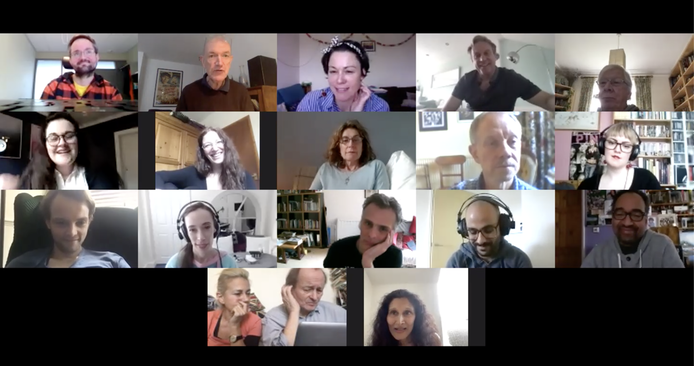|
Present (line by line from top left): Oystein Brager; Colin Ellwood; Zara Tomkinson; John Chancer; David Whitworth; Maria Nygren; Emanuella Lia; Julia Barrie; Jamie Newall; Regine Rossnes; Adam Tyler; Sophie Juge; Simon Furness; Hemi Yeroham; Anthony Ofoegbu; Valerie Gogan/Simon Usher; Sakuntala Ramanee
As sometimes happens, our Friday (15th May) plays unexpectedly discovered common ground. This time the principal common denominator was a focus on women caught between confinement and freedom, questioning the validity of both concepts. For this it was our privilege to be joined by Norwegian friends from Unge Viken Theater: dramaturg and playwright Oystein Brager and two young playwrights whose work we have been exploring in the ‘non-virtual’ world: Regine Rossnes, whose school ‘revenge porn’ drama Exposed was featured very successfully in a combined Holborn reading group session and day-long workshop in those far-distant pre-Covid days of March this year; and Maria Nygren, whose Missing Cat was due for a similar arrangement in April until that became the cruellest month and we all had to retreat to our cramped domestic and virtual confinements. That opportunity still awaits whenever the corona-coast is clear, so it was nice in the meantime to have the chance to read Marie’s earlier Hummingbird, a stark, meditative account of a young woman’s encounters with significant and/or ministering ‘others’ while an inmate at a psychiatric clinic. The trio of progagonist 'Me's' ‘voices’ (boyfriend ‘Him’; friend and fellow inmate ‘You’ and the ‘Doctor’) might be in her room or in her head, or in some liminal and limbic combination of both (an ambiguity contributing beautifully to a delicate sense of intimacy throughout, as of voices whispering in ‘Me’s’ ear in a dream ). As here evoked, the clinic might be a prison or a necessary retreat; her attendant voices restorative or oppressive. The suicide of Virginia Woolf is evoked, but inconclusively, and the attentions of ‘Me’s’ similarly pronominal ‘voices’ are set against the impersonal ever-present chatter of Wikipedia. The play has a distilled sadness as well as moments evoking the brutal reality of a suicide attempt, all tempered by gentle pokes at the strange contradictions of being drawn simultaneously towards life and death; to both containment and nurturing on the one hand and to escape and ‘freedom’ on the other. The hummingbird of the title appears in text from Wikipedia, attributed to no particular voice, so available to be claimed by ‘Me’, or possibly only as a potentially inaccurate external characterisation. ‘Marie’ ‘appears’ as 'herself' at the play's beginning and end, to claim authorship while denying authority over the action. In the Norwegian schools’ tour of the show she apparently did play herself here (but not, I assume, the more-fictionalised ‘Me’?), and she also read these sections on Friday. This, perhaps above all was the most interesting and moving aspect of a compelling experience: the ‘moment of dramatization’ of the mysterious relationship between apparently inexpressible private suffering and its contingent objectification as performed drama. ‘Marie’s’ (the ‘character’s) closing assertion (again invoking Virginia Woolf), gave a beautiful sense of the delicate balance between ‘reality’ and dramatic fiction. Its final line is also perhaps the plays most understated, hard-won but heartening endorsement of life itself: a statement of one who has ‘come through’ (to borrow a phrase from a D.H. Lawrence poem) sufficiently to have written the play, and to be able then to repeatedly witness its enactment as an independent, shared entity: My name is Maria, and it is me who has written this. It is true. It’s also not true. Virginia’s story wasn’t my story. But I was sick. And it’s very hard to talk about it now, hard because, I don't re- member it. I remember particular situations and thoughts I had, but I can't remember how I felt or how I experienced it. It's like a black hole in my memory. Which is why I write. And when I talk about it now, I no longer talk about it for myself. I talk about it for others. Because I don’t feel like that anymore. Next up was Rona Munro’s short two-hander The Basement Flat, set in a world that could have been our own dystopian future or simply a contemporary anxiety dream. A middle-aged, middle-class couple face the new reality of their former lodger become their landlord, stomping around upstairs with a gun, and of their absent now-feral daughter having escaped bourgeois confinement to live out ‘freedom’ in the garden-become-jungle outside along it seems with all the other young people. After attempting to reach out, the couple slowly retreat into the comforts of denial, tea and the confines of their small flat. This was a genuinely unsettling, richly imagined half-dream-play capturing our very current sense of imminent societal collapse and loss of bearings. We then concluded a very rich afternoon with another Norwegian script – Jon Fosse’s brief coda to Ibsen’s The Doll’s House, Freedom, in which a Nora figure comes back, years later, tired of the discovered bleakness of ‘freedom’ but much too late to reclaim whatever possibly nourishing ‘containment’ she has previously escaped, seeking the equivalent of Marie’s institution and Munro’s couple’s flat….would any return here have a more fulfilling and authentic than either? We never find out, as her ex-husband has re-married, and all three end up denying any validity to what had gone before.
0 Comments
Leave a Reply. |
INDEX of dates:
INDEX of playwrights and plays:
INDEX of contributors:
|

 RSS Feed
RSS Feed
